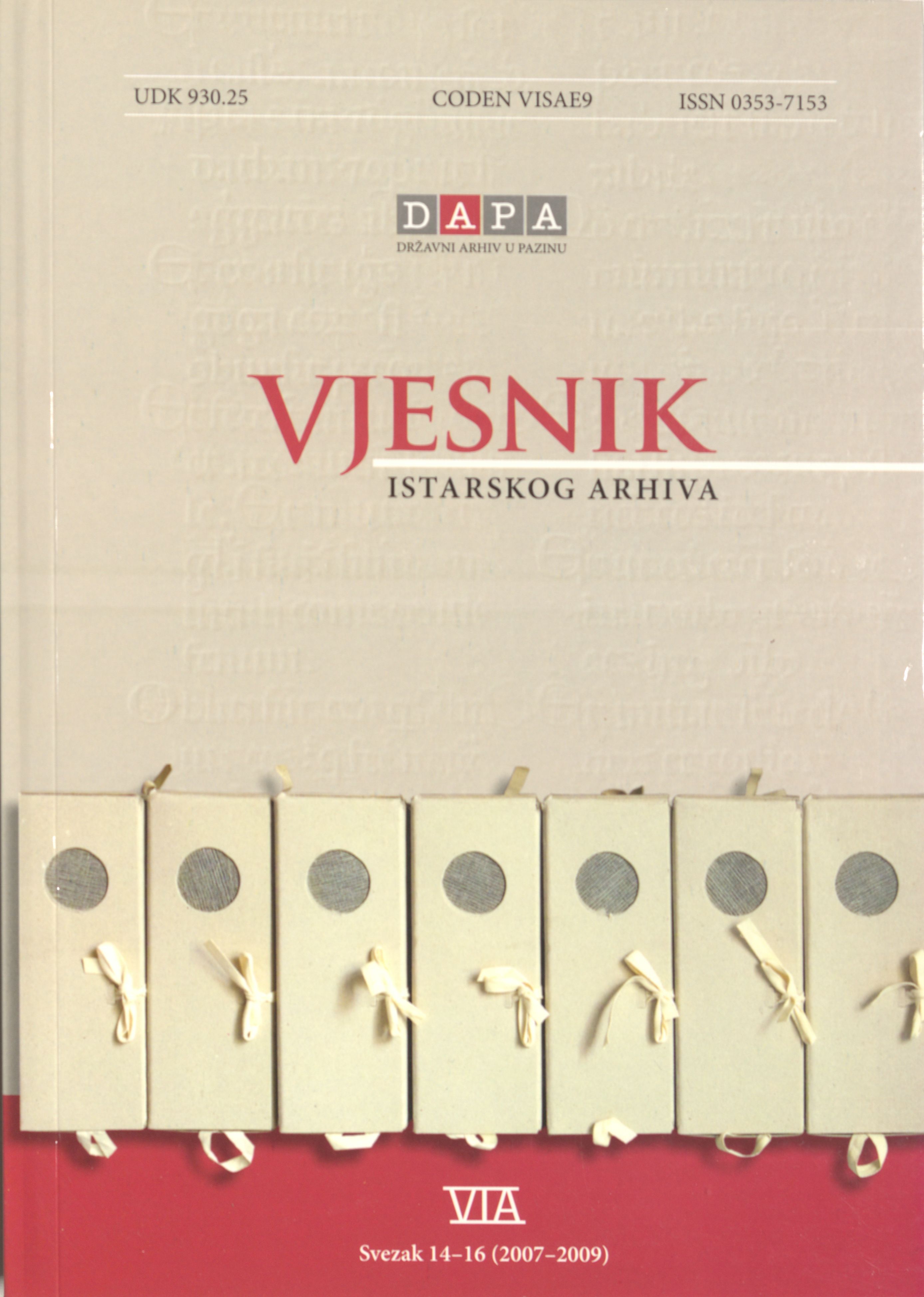Sumarno-analitički inventar fonda Bilježnički arhiv u Puli (1645.-1954.)
Keywords:
notaryship, notaries, archives, notarial archives, judiciary, processing archives, history of institutionsAbstract
The Fonds HR-DAPA-903 Notarial Archives in Pula (1645/1954) provides an immediate and representative source of information on the work of the District Notarial Archives in Pula (Archivio Notarile Distrettuale Pola, 1929–1947) and its predecessors – Austrian notarial organisations operating after 1854 with the District Court in Rovinj, and after 1918 in Pula, and maintain a part of the Istrian notarial records originating in the period between 1854 and the second half of the 20th century. Apart from the archives of the District Notarial Archives in Pula, which took over immediately after its establishment the archives of the abolished Austrian Notarial Archives and Chamber, created in the period from 1441 to 1929 (about 1572 technical units), inventoried them completely and partly carried out archival processing, thus maintaining a total of 2376 books and bundles of notarial records, the Fonds also keeps parts of the Austrian Chamber of Notaries, which is currently the only processed source of information on the members of the Chamber of Notaries and holders of office within the functions of the Notarial Archives arranged according to the Austrian notarial rules and regulations. Documents created during the activities of notarial bodies, included in the archives of the Italian successor (transfer schedule, 1863–1927) and archives created by the District Notarial Archives in Pula (1929/1954) represent an additional source for the history of activities of single notaries whose archives are today preserved in other fonds of the State Archives in Pazin, as they contain information on the change of the head office, death or termination of activity of a notary. The archives is at the same time an important benchmark in the reconstruction of the whole archives of single notaries where they have not been preserved until today. Parts of the fonds are a complementary source for the study of the period from 1945 until 1947 and the process of a gradual deconstruction of the functions of Italian state organisations. In the description of notarial archives, archival descriptions were concentrated on the general context of their activities – effects and implementation of special rules related to general business and expert functions. In this process, specific conditions in which the Archives carried out its activities were presented to the greatest possible degree: profiles of the employees, working and storage rooms and communication with the superior bodies. When describing the professional functions, the system of archival processing, evidence and storage of archives during the Italian period were particularly emphasized. Within the general context, the description gives a summary overview of the history of the traditional notaryship (until 1814) on the territory of Istria and provides an insight into the period when the functions of a notary were carried out by Austrian offices of civil law with the district commissariats (1814–1850). Along the general overview of the beginnings of modern notaryship in Istria (after 1850), differences between the Austrian and Italian organisation were compared. Of the archives subfonds which was preserved with the notarial archive, the most valuable parts are the books containing transcripts of wills (1645/1815) made by the Rovinj Municipality offices and then transferred to the Austrian Notarial Archives together with the archives of the notary in Rovinj and the wills created on the territory of Pazin (1814–1850) during a period when notary duties were carried out by offices of civil law transferred into the Archives of the Italian Magistrate’s Court after 1929. The notarial archives which was stored with the Italian Archives being only partially accessible and notarial archives, previously stored by the Archives and today by the State Archives in Pazin, being preserved in the Collection of Unopened Wills and 14 notarial fondss of the State Archives in Pazin (notaries of Buje (1860–1927), Buzet (1881–1943), Labin (1798–1947), Motovun (1878 1921), Pazin (1858–1942), Poreč (1852–1947), Pula (1626–1947), Rovinj (1597–1943), Vodnjan (1857− 1945)) and the State Archives in Rijeka (notaries of Cres and Lošinj), within the archival descriptions links have been established towards the archives which is today, due to the history of the fonds, preserved separately. Indirectly, by representing various archival approaches to storage and processing of records during the period of Italian care (1929–1947/1954) and the post-war care in Rijeka (1947/1954–1991) and Istria/Pazin (after 1991), the paper considers the connection between professional procedures in processing archives and the later accessibility and unity of archives and accessibility of information relevant for the history of institutions.
Downloads
Published
Issue
Section
License

This work is licensed under a Creative Commons Attribution-NonCommercial 4.0 International License.

